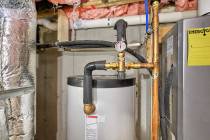HOA board wants a cut of the community game money
Q: I enjoy reading your homeowners association column in the Las Vegas Review-Journal.
I live in a 55 and older community. We have a new HOA board and a new management company. The board has decided, based on information from this new management company that from here forward they will take 5 percent of the winnings from our clubs — poker, bunco and trivia. It’s my understanding this board is now also stating they are “registered” as a charity. They have told the organizers of these games that at the end of the evenings they should write them a personal check for this 5 percent of the winnings. We’ve had these game nights once a month for six years; our old management company never asked for money. Is what we’re having to do now correct? I contacted someone from the Gaming Commission, and he stated they, the Gaming Commission, do not have an interest in this. I can’t find any reference to this in our covenants, conditions and restrictions, and no information from the HOA board regarding their use of these funds has been disclosed. Any help or information you would have regarding this “contribution” to our suddenly “ charity” board will be greatly appreciated.
A: Wow. Your first step is to review your governing documents, your CC&Rs and bylaws, to determine if these documents allow the board to receive funds from the club’s winnings. Next, your board needs to provide actual documents that support their claim as having been “registered” as a charity. If the board or management company fails to provide them, your next step would be to contact the Ombudsman Office at the Nevada Real Estate Division for them to investigate.
Q: I am on a HOA board. We have 427 units, some town homes and condos. The town homes have attached garages, but the flats have assigned parking bays under carports.
This evening a resident approached me asking about electrical vehicle charging stations. He is looking to purchase an EV or plug-in hybrid in the next few months and is wanting to install a charger at his parking stall. There is electrical going to the carports, but it’s paid by the HOA.
What is our association’s responsibility going forward? I know California civil law indicates HOA covenants are unenforceable when it comes to EV chargers and Las Vegas has become basically SoCal East. Are the trends leaning toward this same type of policy? Thanks for any insight you may have.
A: At this time, there are no Nevada state laws requiring an association for providing the EV charging stations. The issues for providing them would be whether there was space for them at the community without taking away a parking space, how to charge the use of the electricity by the homeowner from a general association electric meter and if there was space, who pays for the installation or rental fees for the EV charging stations. There may be other issues to consider. Do not be surprised if the Legislature looks at this issue in 2025.
Q: I came across an article you wrote for the Las Vegas Review-Journal a couple years ago about new laws for HOAs. I’m wondering if you know of a law for HOAs in Nevada where they have 35 days to approve a project and if they do not respond within 35 days, it is considered automatically approved?
I’ve tried to search for this law online and can’t find anything. I submitted a project with my HOA and it is going on 45 days and they have not approved it yet. They’ve told me they have 45 days to approve/deny, not 35 days.
A: There is no Nevada law that addresses this. You need to review your governing documents under architectural approval. You should see the time response under this section of your 45 days.
Barbara Holland, CPM, is an author, educator and expert witness on real estate issues pertaining to management and brokerage. Questions may be sent to holland744o@gmail.com.




























